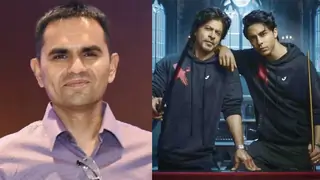Glancing over the last two decades, the nawab admits to a considerable amount of wasted time and a fair bit of confusion. "I think my mind was not fully grounded in the choices I was making. Even my first marriage was too early and a little unfair to the people in my life, including Amrita," he reminisces.

Actor Saif Ali Khan talks about his journey so far, the choices he shouldn't have made and the lessons he has learnt over the last two decades
Saif Ali Khan is spontaneous, witty, articulate and honest, at times almost brutally so, about many of the choices he has made in his career as well as his personal life. As you settle in for an interview with him, you discover that he is also surprisingly unassuming and perfectly matter-of-fact in his responses to certain issues that would cause most of his colleagues to cringe. In the capital recently for the premiere of Happy Ending, he gives us a candid glimpse into his journey as an actor and as a person, affirming that even though he has made several mistakes in the past, he is now moving towards a point in his life where he can look back and find happiness in having set them right.
The art of parenting: "My father was a very wise man," the actor says as he begins to explain not having taken up cricket as a career. "He knew it would be too much pressure to carry on his as well as his father's legacy and that if I didn't do well, it would ruin my life," he shares and adds that he has the same advice for his own children as Mansoor Ali Khan Pataudi did for him. "He had said to me, do whatever your heart is in aur mujhse paise mat maanga karo," he laughs. At 18, the actor had joined a Delhi-based advertising agency in a bid to fend for himself, but his first paycheck came from his first film. He recalls, "Towards the end of my father's life, he was worried about the medical bill and my sister had told him, don't worry, your son will take care of it. It's quite a story, really."
Growing up
Glancing over the last two decades, the nawab admits to a considerable amount of wasted time and a fair bit of confusion. "I think my mind was not fully grounded in the choices I was making. Even my first marriage was too early and a little unfair to the people in my life, including Amrita," he reminisces. Today, he seems to have found greater stability and solidity in life. "You feel different at 40. You feel more grounded because you're no longer running around in your head. I think over the last few years, I've also gained maturity with occurrences like my father passing away. I've become more concerned about my mother, my children, my marriage...and I think that kind of maturity shows on your face with time. I see it on myself on screen, which makes me feel good as an actor too because I feel as though I look more like a man now. Maybe this growth in me has been a bit delayed, but I feel sorted, calm and happy now. At 50, I don't want to look back at my life and see that it has been a mess. I want to look back and see that at some point, I fixed it," he says.
Learning curve
After two successes in the form of Race 2 and Cocktail, Saif's last two films haven't done nearly as well as he would have liked. Talking about the factors that drove him towards taking up Bullett Raja and Humshakals and why he thinks they didn't work, he says, "I had just had two hits and wanted to try something different. I thought Bullett Raja would be a nice rustic role and a comedy with Sajid Khan would be something that the whole of India enjoys. But these things go wrong. Humshakals also had regressive elements and anything regressive will be abused in today's India. I think our country is at this moment in expansion mode in terms of our government as well as our attitudes. People will not blame you for trying something new, but they will blame you for trying something regressive. This obviously didn't strike me at the time of signing on, probably because I was having a good time and was in an oh-it's-all-fine mode. Then I got a jhatka later." Even as a producer, he seems to have crossed a learning curve to make more calculated and informed decisions about his projects. "One of the things you learn as an adult is how to live within a budget. You earn a certain amount, I earn a certain amount, Prince Charles earns a certain amount...everyone has a different budget to work with. You have to be smart about it. You must understand how much your film's market is. If its first day is likely to make eight crores, then it should not cost more than 10-12 crores to make. It can be done. With this film, for instance, I decided that I'll charge this much, shoot for this number of days, finish filming with this much expenditure, stay at The Imperial, have this little premiere, call the press...this is the universe I'm working within, and at the end of it the investor should make money. It's a stupid move to make a 70 crore film if it opens at this much. That's an error in pricing somewhere and we've all done that in an attempt to make a good film. But that is precisely the art," he quips.
Playing safe
Where top-wrung A-listers like SRK and Salman have been inclined towards doing commercially viable cinema verging on eternal sameness, Saif points out that not being in the same league as them gives him an advantage. He explains, "I think with the really big stars a sort of Tom Cruise trap comes into play. They're big and therefore need to do certain things to live up to that stature. Also, the audience really does have a choice here. I think most people would actually be disappointed if they had to watch Shah Rukh or Salman in a movie like The Lunchbox. But they'll be able to see me in a movie like that. They already have, in fact. I'll do a Go Goa Gone or an Omkara and it is in my nature to do a Being Cyrus. Even Happy Ending is a good start and the films I'm looking at doing now are all going to be good films, even if they don't make it to the hundred crore club. I want to be part of a film that is a commercial success as well as good cinema."
Tides of change
Having stepped into the Indian film industry in the early 90s, the actor has seen it through several of its phases. Reflecting on the changes he has seen over the years, he argues that transformed attitudes within the industry are intrinsically tied up with the overall transformation Indian society has seen with the passage of time. "There's a value system that has come into our movies and there's an identity forming in India that is both impressive and distinct from what it was earlier. Globalisation has brought us to a point where we can be busy with ourselves and don't actually have to look at Europe or America for anything anymore. I think it's going to be amazing from here on. We're going to find our own sexuality, our own business, our own attitudes, value systems, fashion...and the world is going to come to us, I'm telling you. It's going to be insane," he asserts.
On religion
That Saif is in a reflective mood is evident from his observations about India's socio-cultural growth. That he has been in a reflective mood in general for some time now becomes evident when he responds to a question about his religious views. "I don't know what I believe any more. I don't think there is a personal God or that someone out there needs to listen to me. I think someone should be listening to the beggars starving on the road and not me saying meri picture hit kara do. Why should I be granted more crores and the beggar nothing at all? Karma? I can't believe in that. The beggar is allowed to say and believe what he wants because he's the guy having a terrible life. I can't complain," he asserts and goes on to say that with religion, as with cinema, music and art, everything is coloured with death. "Life is about death too, in so many ways. Our attitudes and philosophies are conditioned by it," he pontificates and adds that death is also indispensable to change. "The trouble with religion is that if something is taken to be the word of God, how does one modernize it? Someone has to wake up one day like Prophet Mohammed or Jesus Christ and say that I have heard God and He is saying that it is okay to do this, or that. Then he must be condemned and killed. And after many years his words will inspire new religion. If something is the word of God, the only person who can change it is God himself," he concludes
.






































0